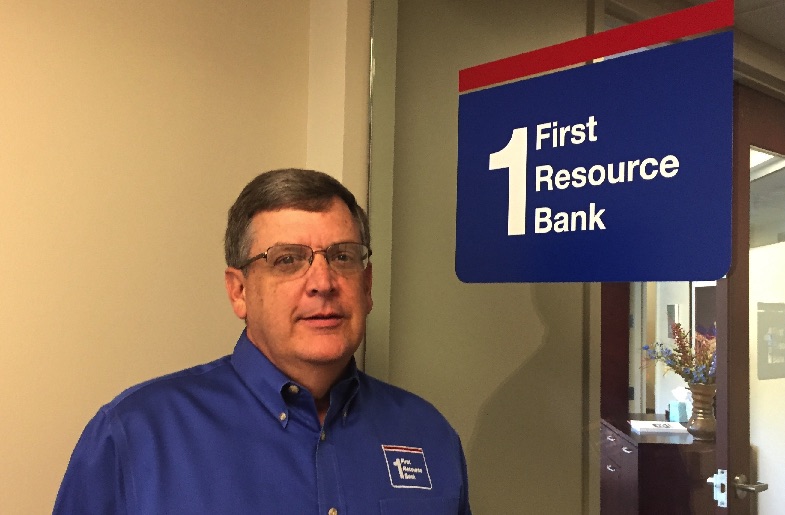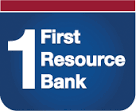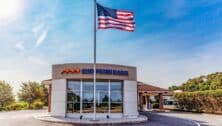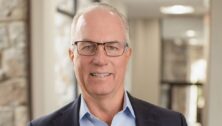Chester County Leadership: Glenn Marshall, President & CEO, First Resource Bank

 Glenn Marshall, the President & CEO of First Resource Bank, spoke with VISTA Today about growing up in Roxborough, the youngest of three children, playing street then ice hockey in high school, and discovering his leadership potential when he was promoted to lead Central Penn Bank’s credit department two years after graduating from Drexel.
Glenn Marshall, the President & CEO of First Resource Bank, spoke with VISTA Today about growing up in Roxborough, the youngest of three children, playing street then ice hockey in high school, and discovering his leadership potential when he was promoted to lead Central Penn Bank’s credit department two years after graduating from Drexel.
Marshall tells VISTA Today how he and Lauren Ranalli worked countless hours over an eight-month period to launch First Resource Bank, a bank Marshall calls “a high touch, high technology community bank hybrid,” in record time in May 2005. Looking forward, Glenn talks about the opportunities in front of the bank and how two innovative programs aimed at nurturing the county’s millennial talent and another that encourages customers to network and do business with each other help his organization give back to the community while staying connected to an ever-evolving marketplace.
Where did you grow up, Glenn?
I was born in 1958, the youngest of three children, in Lankenau Hospital and grew up in the Roxborough section of Philadelphia. My father was an engineer who did estimating for a manufacturing company that produced machinery for the food and fabric drying industries. My mother was the head nurse at Simpson House on City Line Avenue. Later in life, she was the company nurse for Central Penn Bank and then PNC Bank in Center City.
[uam_ad id=”58459″]
What memories do you have of growing up in Roxborough?
Even though it was part of Philadelphia, people in Roxborough never saw the town as part of the city. The place had a small town feel to it. One set of grandparents lived around the corner from us, and the other set was just five minutes away. I played softball for the church softball team and youth group. In the summer, I left my house in the morning with a couple of bucks in my pocket and my baseball glove and didn’t come home again until dinner time.
Playing baseball was so ad-hoc back then. We didn’t have a ball, so we would all chip in and buy one from the hardware store up the street. The owner stocked baseballs because he knew we needed a steady supply of balls. When we played, we had our own set of rules. First, since nobody wanted to catch, the batter had to swing at every pitch. Second, since there was no one to play right field, it was an automatic “out” if the batter hit the ball that direction. Finally, when it was my team’s turn to bat, I left my glove at my position for the next guy because there weren’t enough gloves.
Other than baseball, what sports did you play growing up?
I played baseball as a kid and soccer in high school. I wasn’t all that good at soccer and started to play ice hockey instead. I managed to scratch out a varsity letter in hockey, but I’m not sure I was all that good at hockey either.
Were you part of the wave of kids attracted to hockey by the Flyers’ success in the mid-1970s?
I was. A group of us from school would frequently attend Flyers practice at the Class of ’23 Rink on Penn’s West Philadelphia campus. We would sit right next to the ice, and the Flyers players would toss their broken equipment our way. We were so excited to get a broken stick! I was at the Spectrum attending a Wings pro lacrosse game the night the Flyers won their second Stanley Cup.
Were you a good student, Glenn?
I was on the academic track at Roxborough High School. I wasn’t the smartest kids, but I worked hard and got good grades. I suppose if I hadn’t run around so much I could have gotten straight A’s.
Did you have any jobs in high school?
In the summer, I was the green grocer for an Italian market that sold deli items, fresh produce, and milk. I arrived at 6:00 or 6:30 every morning, got everything out on the shelf and was done by 11:00.
[uam_ad id=”58459″]
What lessons did you learn on that job that stay with you today?
Work hard! Don’t be afraid to get up early and work hard. It was a lesson I had learned at home from my mom. To this day, I count on being able to outwork anyone. I still get up at 6:00 or so and arrive at work by 7:30 most days. Someone might be smarter than me, but I’m going to outwork them.
Where did you go to college?
Drexel accepted me as a Civil Engineering major. Interestingly enough, I took an accounting course from an amazing teacher my last semester in high school that changed my trajectory. Because of that course, I fell in love with business. By the time I got to Drexel in the Fall of 1980, I had already changed my major to Commerce and Engineering, which was an engineering degree with all the business courses needed to run an engineering company. By the end of my Freshman year, I changed my major again to straight business and ended up graduating with two degrees; one in Marketing and a second degree in Accounting.
How did you get into banking?
Right out of school, someone suggested I get a job in the credit department at a bank. They thought the job would teach me a lot about business. I graduated on a Saturday and started as a credit analyst on Monday. I was in the credit department for a couple of years and was asked to run the department when my boss got promoted. I was 23-years old and had 20 people reporting to me.
How did having so many people report you at such an early age feel?
It was pretty heady. I had officers of the bank and people who were just a couple of years away from retiring report to me. I needed to focus on the jobs at hand every day. It was a very good experience.
When did you start to realize your leadership potential?
When I was running the credit department at Central Penn Bank. Looking back, I was not the most motivated high school or college student. In high school, I was on the fringe of the group of motivated students and I was hanging on by my coattails. I started to see I had potential in a Statistics course in my sophomore year of college but I didn’t fully realize it until Central Penn Bank.
What did you do after Central Penn?
I went to Hamilton Bank and worked with Wayne Greist. Wayne taught me to how to evaluate a financial statement and know if the loan was business we wanted.
[uam_ad id=”58459″]
What motivated you to launch First Resource Bank?
After Hamilton Bank, Altantic Financial and Elverson National Bank over a 15-year period, I went to Stonebridge Bank. Over time, Stonebridge had morphed into an internet bank. I told George Agle, who was one of my mentors, that I wanted to run my own bank. George promised me if I stayed at Stonebridge, he would get me the experience I needed to run a bank someday. At the same time, a group of us were talking about starting a bank like Elverson National Bank or Peoples Bank of Oxford, to get back to a community banking model. First Resource Bank is the best parts of both internet and community banking.
That’s what First Resource is; a high touch, high technology community bank hybrid. We don’t want to have a branch on every corner, but we do need to be available to our customers 24/7. Fifty-five-percent of our customer’s daily deposits come to us electronically.
Was starting your own bank a big gamble, Glenn?
Lauren Ranalli, who co-founded the bank with me, and I thought there were 10,000 things to do to open our doors. We were wrong! There were a million things we needed to do! We both worked so many hours to get everything done. We started the process in September of 2004 and opened our doors nine months later in May of 2005.
Looking forward, what are the opportunities in front of First Resource Bank?
We see the value of a small community bank only increasing as mergers and acquisitions create scarcity value for organizations like First Resource Bank. Our ability to deliver customized solutions to small businesses is totally different than the product offerings of the bigger banks.
We recently raised $4 million in new capital which allows us to extend approximately $40 million more in loans locally which is very exciting for us. Our deposit products are virtually all free so as we continue to spread the word about our unique approach to pricing our deposit products, it’s a “no brainer” to switch deposit accounts to First Resource Bank. We are very encouraged by the strong deposit growth we have seen over the last year and very excited for what the future holds in this area.
What are you doing to nurture First Resource’s culture and competitive differentiators?
We never miss a settlement! A customer may choose not to do the deal because the property isn’t right or because the piece of equipment they’re thinking of purchasing no longer makes sense, but the deal will never not get done because the financing didn’t get done.
Our culture is customer-focused. Our best referral sources are our customers because we’ve done a great job for over the last twelve years
We’re very selective about the skill set of the people we hire. We only hire team members that get and embrace the customer centric business model we’ve created. We do quite a bit of “deprogramming” for bankers that worked at other institutions to assure them that our outside-the-box, customer-first ideas are what makes us different from every other bank.
Giving back is a huge part of our culture. Even though we are a small community bank, we have donated over $1 million to local charities and schools, all in the Chester County area. We gather deposits and make loans locally, and our charitable efforts are all in that same local area.
[uam_ad id=”58459″]
Talk about First Resource’s millennial and customer referral programs?
Our Millennial Professional Board is an investment in the future business community. When I was younger and just starting out in my career, I always loved learning from other people whether they were my peers or a mentor. As more and more millennials join the workforce and increase their purchasing power, groups like this will be invaluable to businesses as they look to attract new leaders and customers.
Millennials have different tastes, and the board’s input on technology, product offerings, marketing, and other topics is a unique way to help First Resource Bank grow its customer base. Ultimately, we hope the Millennial program will be a business education program. Other banks across the country have explored the concept, and I thought it was a smart idea.
We also established a business referral program, our First Resource Accountholder Network (FRAN). The concept is to give our customers a chance to network and do business with each other. We do networking events at the branch and always on the lookout for more ways to bring our customers together, to learn about what each other do, discover what they have in common and give them the opportunity to work together.
Finally, Glenn, What is the best piece of advice you ever received?
At my first annual review at Central Penn Bank, the gentleman doing the reviews gave me all ‘Fours’ (on a 1 to 5 rating). At the end of the review, I asked him what I would have to do to get a ‘Five.’ He told me, and I’ve never forgotten it, ‘Glenn, if you were perfect you wouldn’t be working here.’
While his comment motivated me to work harder to get the top rating, it also reminded me that no one is perfect. I don’t want people here at the bank to ever be afraid of making a mistake. The fear is in not trying and learning from a mistake. Around the bank, we frequently talk about being smarter today than we were yesterday. We want to continue learning and getting smarter every day.
[uam_ad id=”60101″]
Connect With Your Community
Subscribe to stay informed!
"*" indicates required fields




![95000-1023_ACJ_BannerAd[1]](https://vista.today/wp-content/uploads/2023/03/95000-1023_ACJ_BannerAd1.jpg)















































